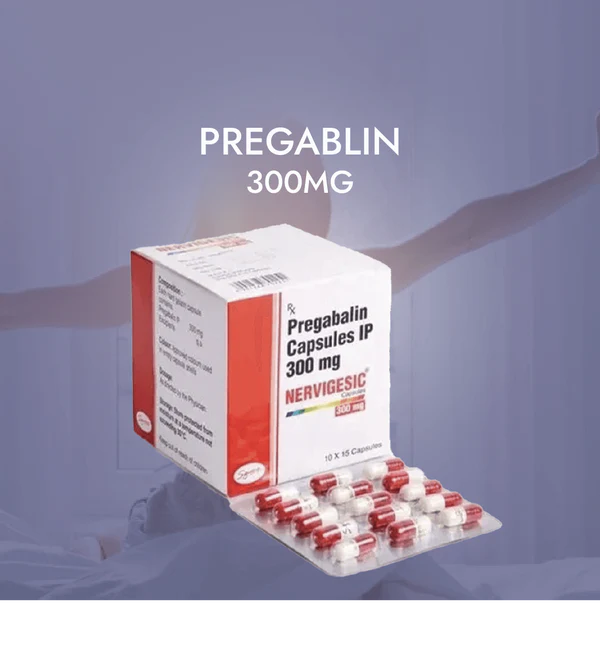Description
A Deep Look at Pregabalin (Lyrica)
Doctors most often prescribe Pregabalin or Lyrica, to treat nerve pain, epilepsy and anxiety disorders. Because it is an anticonvulsant, it is recommended to patients with diabetic neuropathy and fibromyalgia.
What It Is Used for?
To ease the ease nerve pain caused by certain disorders, many healthcare providers use Pregabalin. Many patients with these conditions are prescribed medications like Pregabalin, not antibiotics, as they target nerve-related symptoms.
- Nerve Pain: Pain that comes from diabetes, shingles or injuries of the spinal cord is known as nerve pain.
- Epilepsy: It can be taken together with other medicines to control seizures.
- Generalized Anxiety Disorder (GAD): To alleviate anxiety symptoms in adults, Pregabalin is effective.
- Fibromyalgia: It often causes patients pain all over the body and Pregabalin may be used to treat the side effects.
Chronic nerve pain or anxiety are the common problems Pregabalin is prescribed to help with.
How The Medication Works?
Pregabalin slows the brain’s nerve impulses function. The drug binds to specific channels on nerve cells that decrease the release of glutamate, norepinephrine and substance P, important for pain and anxiety sensing. It soothes your nerves and helps to relieve the signs of your disease.
Dosage Information
How much Pregabalin you take depends on what condition you are treating. Guidelines for giving this medicine usually are:
- Starting Dose: Most patients begin with 75 mg taken twice daily (150 mg total per day).
- For maintenance: Your dose may rise to 150 mg or 200 mg each time, as high as 600 mg each day.
Important Notes:
- It doesn’t matter if you take Pregabalin with or without food.
- You should always take your dose at the same times each day.
- Suddenly stopping Pregabalin is not safe, so work with your healthcare provider for a slower way to stop using the medicine.
- Do not change your doses unless your health provider suggests it.
Side Effects
Even though the common reaction to Pregabalin is generally positive, there are still side effects possible for some. Less common side effects are:
- Chest pain or tightness
- cold sweats
- cool, pale skin
- cough producing mucus
- difficult or labored breathing
- muscle aches, twitching or jerking, or weakness
- noisy breathing
- seizures
Rare side effects are:
- Blistering, peeling, or loosening of the skin
- bloating or swelling of the face, arms, hands, lower legs, or feet
- chills
- cough
- diarrhea
- difficulty with swallowing
- dizziness
- fast heartbeat
- hives, itching, skin rash
- joint or muscle pain
- unusual tiredness or weakness etc.
Things That May Seriously Impact Your Health
If you have any of the listed symptoms, get help right away from a medical professional.
- Suicidal thoughts
- Problems of swollen hands or feet
- Possible symptoms are a rash, itching or trouble breathing.
- Someone experiencing muscle pain, feeling weak or having a fever
Stopping the medication immediately may cause familiar withdrawal symptoms.
Prescription Requirements
Pregabalin is designated a Schedule V controlled substance in the United States and it requires a doctor’s OK to be prescribed. Because it is available on prescription, it may be misused and can become addictive. Different countries have their own rules, so make sure you check what’s allowed where you are.
Warnings & Precautions
Pregabalin should not be taken without first telling your doctor about:
- Have kidney or heart problems
- Are pregnant, planning to conceive, or breastfeeding
- Have a history of substance abuse
- Are taking medications such as opioids, antidepressants, or sedatives
Take care not to drink while taking Pregabalin, because this can make you drowsy, sick or even worsen serious problems. Until you understand how the drug affects your body, it’s wise not to drive or use heavy machinery. Be sure to talk to your doctor before starting this medicine with another.
Wrapping It Up
Pregabalin (Lyrica) is an effective medication for managing nerve pain, reducing seizures, and treating anxiety. While medication helps many, people should only use it when supervised by experts and safely. If you understand Pregabalin and what its side effects are, you will feel more confident in looking after your health.
(Disclaimer: Please note that this article does not give specific medical advice. Try to talk with your doctor before starting, changing or stopping your medication.)
Frequently Asked Questions (FAQ’s)
Q1: Can I just stop taking Pregabalin?
You should work with a doctor to gently reduce your medicine use, as this helps prevent uncomfortable symptoms.
Q2: Can individuals form an addiction to Pregabalin?
Yes, individuals with a history of substance abuse may be at higher risk. Always use this medication as prescribed.
Q3: How soon will Pregabalin begin to help me?
It may be a few days before you feel better from nerve pain, but the complete benefit could take several weeks to appear. If you’re trying to help someone with anxiety, you might see progress slowly.
Q4: Should I avoid or take Pregabalin at the same time as antidepressants?
Which antidepressant you are taking matters a lot. It’s good to tell your healthcare provider about any prescription drugs or supplements you are taking.



Reviews
There are no reviews yet.